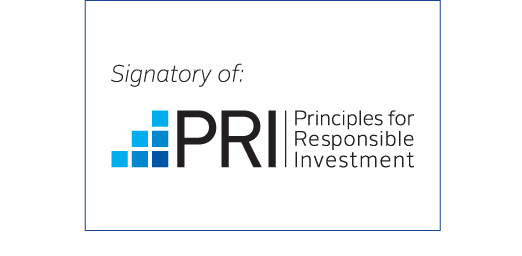SUSTAINABILITY ESG at VanEck
Investing Today for a Brighter Future.
ESG investing is an approach to investing that drives positive environmental, social and governance (ESG) outcomes alongside financial results, aligning investment opportunities with investors’ values.
Our Responsible Investment Policy
What is ESG Investing?
ESG investing incorporates environmental, social and governance factors and ethical considerations when making investment decisions.
Environmental
Environmental factors range from energy use and impact on climate change, greenhouse gas emissions, waste, pollution, natural resource conservation to animal treatment.
Social
Social factors range from a company’s relationships with its stakeholders and includes working conditions, impact on local communities, health and safety and employee relations and diversity.
Governance
Governance includes the proper use of accurate and transparent accounting methods, fair voting, avoiding conflicts of interest and not engaging in illegal behavior.
VanEck considers ESG factors in various ways in its different investment policies. We believe that an improving ESG record should translate into a company’s differentiated operational strength, financial performance and prospects and have an impact on valuation.
As intentions, thinking and evidence in the ESG space continue to develop, we remain committed to identifying those factors that can provide enhanced investment opportunities for shareholders.
Our Commitment to Responsible Investment
VanEck is a signatory to the Principles for Responsible Investment (PRI), showing our commitment to responsible investment.
Governance—“active engagement” in particular—has always been a major consideration in our research processes for active funds and our efforts to fine-tune the ESG questions to ask in each industry are ongoing. We believe that an important part of our responsibility to clients goes beyond encouraging change that can enhance, protect and provide opportunities for shareholders to meet their investment objectives. It also entails seeking to mitigate associated risks, including those related to ESG.
Van Eck Family's Forest Project
Active Strategies
Governance is especially important for our active emerging markets strategies. Companies can have higher concentrations of inside ownership and more flexible rules. With our active gold mining strategy, we rigorously monitor companies’ adherence to industry best practices and have much more meaningful interactions with company boards on ESG topics compared to 10 years ago.
Passive Strategies
Within our passive strategies we work closely with our index providers to determine if and how to effectively integrate ESG into the index construction of the indices the ETFs track. Evaluating ESG integration is always one of the first steps in the product development process within VanEck.
Sustainable Finance Disclosure Regulation (SFDR)
The SFDR is a regulation in response to the Paris agreement of 2015 and the European green deal. These EU initiatives aim to lower the Co2 footprint in the EU and limit global warming well below 2°C.
The SFDR is intended to increase transparency on sustainability among financial institutions. The regulation consists of disclosure requirements on the organisational level and fund level to standardise information on the sustainability of investments. It aims to prevent so called “greenwashing” and allow investors to compare investment products on ESG.
The new regulation became effective on 10 March 2021 and VanEck has provided the necessary publication on how Environmental, Social and Governance issues are integrated in to the investment processes of our Active Funds and ETFs.
Integration of Sustainability Risks
Sustainability risk is the risk that the value of an investment will decline as a result of an environmental, social or governance (ESG) event or circumstance. Environmental events include climate change, scarcity of natural resources and pollution. Social events may include labor issues and product liability. Governance can include themes such as shareholder rights, business ethics, diversity and executive remuneration. Sustainability risks can arise in many different forms. With regard to the theme of climate, for example, there is a distinction between transition risks and physical risks, whereby transition risks can be divided into legal and regulatory risks, technological risks, market risks and reputation risks. In addition, the impact of sustainability risk has various scopes, including company-specific, sector-specific and on country level. The occurrence of a sustainability risk can result in other (financial) risks manifesting. This can negatively affect the value of an investment.
Measures taken by VanEck to mitigate sustainability risksSustainability Characteristics of Funds
We have also classified our products based on three SFDR categories.
Article 6
This covers products which do not integrate any kind of sustainability characteristics into the investment process.
Article 8
This covers products with environmental and social characteristics.
Article 9
This covers products which have a sustainable objective.
For all VanEck funds, exclusions required by international laws and treaties apply. The funds do not invest into companies and countries if this is prohibited by sanctions of the European Union, United Nations or the Office of Foreign Assets Control of the United States.
Currently, 8 VanEck funds are classified as products with environmental and social characteristics. For passive funds, the investment policy of the fund is to follow the index as closely as possible. In the composition of the indices, ecological, social and governance (ESG) aspects are taken into account in the composition of the indices of article 8 funds. Companies for instance are excluded based on ESG-screenings. The sustainability characteristics for these VanEck funds are described more thoroughly in the relevant product information.
Sustainability characteristics of these fundsPrincipal Adverse Impacts on Sustainability Factors
European legislation requires financial market participants such as VanEck to disclose whether they take into account principal adverse impacts as defined in European legislation of investment decisions on sustainability factors. Sustainability factors are defined in the legislation as environmental, social and employee matters, respect for human rights, anti-corruption and anti-bribery matters. The adverse impacts of investment decisions on sustainability factors are considered by VanEck Asset Management B.V. (“VanEck”).
In the coming years the disclosure requirements of SFDR will be expanded which will be published on the website and or in pre-contractual documentation such as prospectuses, KIDs and annual reports.
Statement on principal adverse impacts of investment decisions on sustainability factorsImportant Definitions & Disclosures
ESG investing is qualitative and subjective by nature, and there is no guarantee that the factors utilized by VanEck or any judgment exercised by VanEck will reflect the opinions of any particular investor. Information regarding responsible practices is obtained through voluntary or third-party reporting, which may not be accurate or complete, and VanEck is dependent on such information to evaluate a company’s commitment to, or implementation of, responsible practices. Socially responsible norms differ by region. There is no assurance that the socially responsible investing strategy and techniques employed will be successful.
ESG integration is the practice of incorporating material environmental, social and governance (ESG) information or insights alongside traditional measures into the investment decision process to improve long term financial outcomes of portfolios. Unless otherwise stated within the Fund’s investment objective, inclusion of this statement does not imply that the Fund has an ESG-aligned investment objective, but rather describes how ESG information is integrated into the overall investment process.
Investing involves substantial risk and high volatility, including possible loss of principal. Bonds and bond funds will decrease in value as interest rates rise. An investor should consider the investment objective, risks, charges and expenses of a fund or other investment product as described in the sales prospectus of the relevant product carefully before investing.